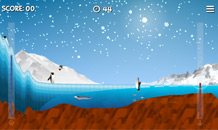
The game can be played at www.iceflowsgame.com and is free to download from app stores.
Scientists develop interactive game demonstrating impact of climate change on the Antarctic Ice Sheet
Scientists and games developers have joined forces to help communicate the impact of climate change on the Antarctic Ice Sheet.
The ice held in the Antarctic Ice Sheet has the potential to cause significant changes in sea level in the future, which will affect many people around the world. As a result, it is important that people have an awareness of the impact of a changing climate on the world’s ice sheets, but this complex system is difficult to understand and predict.
Now the scientists and games developers have produced a free-to-use interactive game, “Ice Flows”, to help demonstrate how the Antarctic Ice Sheet responds to climate change in an accessible way to children and game players of all ages.
The game, which can be played at www.iceflowsgame.com, was launched at the SCAR (Scientific Committee for Antarctic Research) Open Science Conference in Kuala Lumpur. It is free to download from app stores.
The game is built on a simple representation of how ice flows in Antarctica and how it responds to changes in the environment - through changes in snowfall and ocean temperature. It allows players to impose climatic changes to control the extent of the ice sheet to guide penguins to fish; if they get it wrong, the penguin may meet its doom in the jaws of a leopard seal.
The aim is to promote understanding of the complexity of the ice sheet system by enabling the player to carry out their own ice sheet model experiments, much like the scientists working on the research. The game has a number of levels representing how different parts of the Antarctic will respond to climate change.
The game development is funded as part of a research project ‘Ice shelves in a warming world’, investigating the Filchner Ice Shelf system in Antarctica, combining field measurements with numerical modelling of ice flow, ocean currents and the atmosphere. This region is potentially highly vulnerable to changes in ocean currents driven by a changing climate.
The game has been developed by Anne Le Brocq at the University of Exeter, in collaboration with games developers Inhouse Visuals and Questionable Quality, and the British Antarctic Survey, who are leading the research project. The project also involves researchers from the UK Met Office, National Oceanography Centre, University College London, the University of Oxford and the Alfred Wegner Institute in Germany.
Dr Anne Le Brocq, Senior Lecturer in Physical Geography at the University of Exeter, said: “The response of the Antarctic Ice Sheet to a changing climate is very complex and, as a result, is difficult to communicate in a clear and understandable way.”
“The use of a game helps not only to visualise the system, but also to provide an immersive environment for the player to fully understand the behaviour of the ice sheet and how it responds to changes in the environment. Hopefully it’s fun to play too!”
The game development was funded by the Natural Environment Research Council.
Date: 23 August 2016
